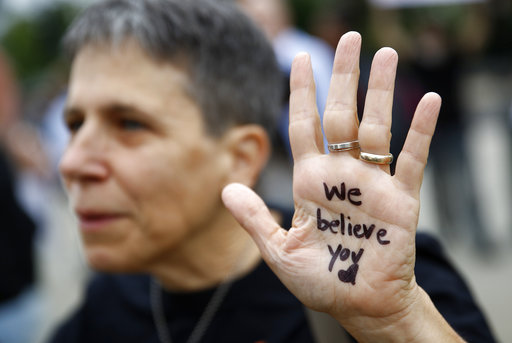EDITORIAL: Humanity in crisis; Kavanaugh case more than politics

A protester displays a message in support of sexual assault survivors on her palm in front of the Supreme Court on Capitol Hill in Washington, Thursday, Sept. 27, 2018. The Senate Judiciary Committee is scheduled to hear from Supreme Court nominee Brett Kavanaugh and Christine Blasey Ford, the woman who says he sexually assaulted her. (AP Photo/Patrick Semansky)
Senior year is the time where high schoolers can finally breathe; SATs are completed, applications are sent, and graduation is approaching. This is the time for my fellow classmates and I to let loose and enjoy our last year with each other, isn’t it?
As a high school journalist, it is in my nature to be consumed by the news, and I cannot help but recognize how relevant the accusations against Brett Kavanaugh are to my graduating class.
High school is the prime time where teenagers experience partying for the first time. As a young woman, it is quite unsettling to think about the possibility of being sexually assaulted at a social gathering that was intended for enjoyment. According to the nation’s largest anti-sexual violence organization, RAINN, females ages 16-19 are four times more likely than the general population to be victims of rape, attempted rape, or sexual assault. Myself, along with the rest of the young women in my graduating class, fall into this category.
Just like the first victim to prompt the Kavanaugh allegations, Dr. Christine Ford claims she was in high school during the time of the assault. I cannot help but point out the disturbing fact that I am the same age that Dr. Ford was when she was allegedly assaulted at a high school party.
This realization sparked anger and confusion inside of me. Why should I have to worry about being raped when I’m only seventeen years old? Why is it that something as innocent as a party can turn into something as repulsive as sexual violence?
Then I read a tweet from the president of the United States.
“I have no doubt that, if the attack on Dr. Ford was as bad as she says, charges would have been immediately filed with local Law Enforcement Authorities by either her or her loving parents.”
What Donald Trump does not understand is that according to the National Sexual Violence Resource Center, rape is the most unreported crime; 63% of sexual assaults are not reported to police. This is due to the fact that 94% of women who are raped experience symptoms of post-traumatic stress disorder (PTSD) during the two weeks following the rape.
Ignorance has no place in regards to sexual violence.
Clearly, the president of the United States is not aware of the effects that victims are left with, including depression, post-traumatic stress disorder, and flashbacks. Not only do victims experience these effects, but they also experience fear. There is fear of being sexually assaulted again. There is fear that if the victim speaks up, the assaulter will strike again. There is fear that no one will believe the victim.
I believe this is a matter of humanity, not politics. It is crucial for women to come out about their experience with sexual assault. We must set an example for our young women and children, to always be brave and to always demand justice. As a young woman on the cusp of eighteen, I anticipate one day every woman across America will feel confident, comfortable, and powerful in sharing their story.
Sources:


Yusuf Amin • Sep 28, 2018 at 8:51 pm
Have only started this 1st year in NPSH, and yet after last year and last summer’s news and psychology, I do admit and regret having performed bad, verbal actions in the past. Even when learning of this, we should all admit our faults without unnecessary fear of retribution in an non-existantial climate. Regrets can leave much room for a better understanding when time takes its place in school.